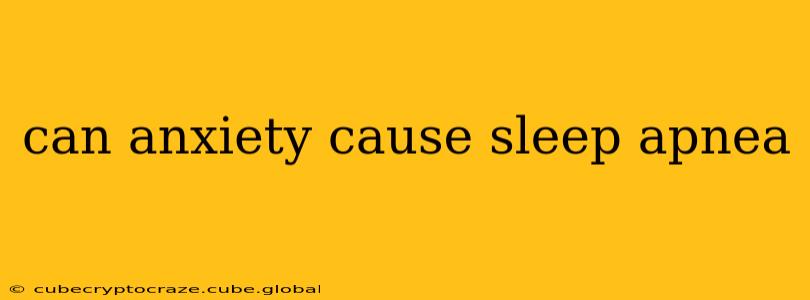Anxiety and sleep apnea are distinct conditions, but their relationship is more intricate than a simple cause-and-effect. While anxiety doesn't directly cause sleep apnea, it can significantly worsen its symptoms and even contribute to its development in certain individuals. This article delves into the connection between anxiety and sleep apnea, addressing common questions and providing a comprehensive understanding of this complex interplay.
How Does Anxiety Impact Sleep?
Before examining the link to sleep apnea, it's crucial to understand how anxiety affects sleep in general. Anxiety disorders frequently manifest as difficulty falling asleep (insomnia), frequent awakenings throughout the night, and overall poor sleep quality. This disrupted sleep is characterized by:
- Increased cortisol levels: Anxiety triggers the release of cortisol, a stress hormone that keeps you alert and interferes with the natural sleep-wake cycle. High cortisol levels make it harder to fall asleep and stay asleep.
- Racing thoughts and worries: The constant stream of anxious thoughts makes it nearly impossible to quiet the mind and relax enough for sleep.
- Physical tension: Anxiety often presents with physical symptoms like muscle tension, a racing heart, and restlessness, all of which hinder restful sleep.
Can Anxiety Worsen Sleep Apnea Symptoms?
While anxiety itself doesn't cause the physical blockage of airways characteristic of sleep apnea, it can significantly amplify its symptoms. Individuals with sleep apnea often experience:
- Increased daytime sleepiness: Anxiety already contributes to fatigue; when combined with the sleep deprivation inherent in sleep apnea, daytime sleepiness becomes even more pronounced.
- Irritability and mood swings: The lack of restorative sleep due to both conditions can lead to heightened irritability, mood swings, and difficulty concentrating.
- Increased apnea episodes: The physical tension associated with anxiety might worsen the already compromised breathing during sleep, potentially leading to more frequent apnea events.
Does Anxiety Increase the Risk of Developing Sleep Apnea?
The research on this connection is ongoing, but some studies suggest that chronic stress and anxiety might increase the risk of developing sleep apnea, especially in individuals already predisposed to it. This could be due to several factors:
- Inflammation: Chronic stress and anxiety are associated with increased inflammation in the body. This inflammation could affect the tissues in the throat, potentially contributing to airway collapse.
- Weight gain: Anxiety can lead to unhealthy coping mechanisms, including overeating or increased alcohol consumption. Weight gain is a significant risk factor for sleep apnea.
- Altered breathing patterns: Anxiety can cause changes in breathing patterns, such as hyperventilation or shallow breathing, which might contribute to the development or worsening of sleep apnea.
What if I Experience Both Anxiety and Sleep Apnea?
If you suspect you're dealing with both anxiety and sleep apnea, it's crucial to seek professional help. A doctor can perform a sleep study (polysomnography) to diagnose sleep apnea and recommend appropriate treatment, such as CPAP therapy. Simultaneously, a therapist can help you manage your anxiety through therapy, medication, or lifestyle changes. Addressing both conditions concurrently is vital for achieving optimal sleep and overall well-being.
How Can I Tell the Difference Between Anxiety-Induced Sleep Problems and Sleep Apnea?
Differentiating between anxiety-related sleep issues and sleep apnea requires professional evaluation. However, some key differences to note are:
- Snoring: Loud snoring, particularly accompanied by pauses in breathing, is a strong indicator of sleep apnea. Anxiety-related insomnia usually doesn't involve such pronounced snoring.
- Daytime sleepiness: While both conditions can cause fatigue, the extreme daytime sleepiness experienced with sleep apnea is often more significant.
- Witness accounts: If a partner observes you frequently ceasing to breathe during sleep, this points towards sleep apnea.
Can Treatment for Anxiety Help with Sleep Apnea?
While treatment for anxiety won't cure sleep apnea, managing anxiety symptoms can certainly improve sleep quality and reduce the severity of apnea symptoms. Reduced stress and improved sleep hygiene can lead to better overall health and a more positive interaction with sleep apnea treatment.
This information is for educational purposes only and should not be considered medical advice. If you have concerns about anxiety or sleep apnea, consult a healthcare professional for proper diagnosis and treatment.
